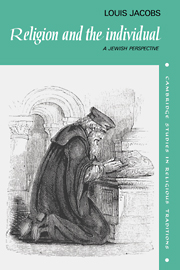Book contents
- Frontmatter
- Contents
- Preface
- List of abbreviations
- 1 Individual significance
- 2 Self-realization as a religious value
- 3 Attitudes to life and death
- 4 Family relationships
- 5 Loving the neighbour
- 6 Communal obligations
- 7 God and the soul
- 8 Does a person's body belong to God?
- 9 Worship with the body
- 10 God and personal freedom
- 11 Immortality
- 12 Conclusion: A question of emphasis
- Glossary
- Notes
- Bibliography
- Index
1 - Individual significance
Published online by Cambridge University Press: 11 October 2009
- Frontmatter
- Contents
- Preface
- List of abbreviations
- 1 Individual significance
- 2 Self-realization as a religious value
- 3 Attitudes to life and death
- 4 Family relationships
- 5 Loving the neighbour
- 6 Communal obligations
- 7 God and the soul
- 8 Does a person's body belong to God?
- 9 Worship with the body
- 10 God and personal freedom
- 11 Immortality
- 12 Conclusion: A question of emphasis
- Glossary
- Notes
- Bibliography
- Index
Summary
It is a truism that Judaism is centred around the Jewish people. This is expressed in the very names for the religion: Judaism, derived from the Greek, and torat yisrael or dat yisrael in Hebrew. When called to the reading of the Torah, the Jew recites the benediction: ‘Blessed art thou, O Lord our God, King of the universe, who has chosen us from all peoples, and hast given us thy Torah.’ The Jewish festivals and fasts commemorate events, joyous or tragic, in the history of the people: the Exodus on Passover; the giving of the Torah on Shavuot; the dwelling in booths on Tabernacles; the deliverance from Antiochus on Hanukkah and from Haman's machinations on Purim; the breach of the walls of Jerusalem on the seventeenth of Tammuz and the destruction of the Temple on Tisha be-Av. Even on Rosh ha-Shanah, when the universalistic note is sounded, and on Yom Kippur, when individual remorse finds its strongest expression, the prayers are voiced in the plural form in such a way that it is the people of Israel who come to present themselves to God on these solemn occasions. Reform Judaism, too, is people-centred, with the Reform idea of the 'mission of Israel’ to be ‘a light unto the nations’. After the Holocaust and the establishment of the State of Israel, an even greater emphasis has naturally been placed on Jewish peoplehood.
This stress on the Jewish community has provided Jews with the fortitude to survive and it has freed the individual Jew from a morbid retreat into egotism and selfhood.
- Type
- Chapter
- Information
- Religion and the IndividualA Jewish Perspective, pp. 1 - 9Publisher: Cambridge University PressPrint publication year: 1992



